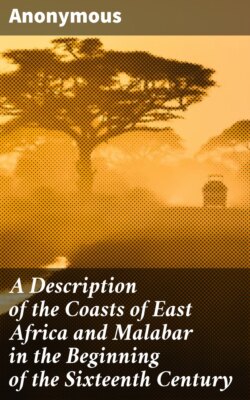Читать книгу A Description of the Coasts of East Africa and Malabar in the Beginning of the Sixteenth Century - Anonymous - Страница 20
На сайте Литреса книга снята с продажи.
SOFALA.
ОглавлениеTable of Contents
Having passed the Little Vciques, for the Indies, at xviii leagues from them there is a river which is not very large, whereon is a town of the Moors called Sofala,[7] close to which town the King of Portugal has a fort. These Moors established themselves there a long time ago on account of the great trade in gold which they carry on with the Gentiles of the mainland: these speak somewhat of bad Arabic (garabia), and have got a king over them, who is at present subject to the King of Portugal.[8] And the mode of their trade is that they come by sea in small barks which they call zanbucs (sambuk), from the kingdoms of Quiloa, and Mombaza, and Melindi; and they bring much cotton cloth of many colours, and white and blue, and some of silk; and grey, and red, and yellow beads, which come to the said kingdoms in other larger ships from the great kingdom of Cambay, which merchandise these Moors buy and collect from other Moors who bring them there, and they pay for them in gold by weight, and for a price which satisfies them; and the said Moors keep them and sell these cloths to the Gentiles of the kingdom of Benamatapa who come there laden with gold, which gold they give in exchange for the before mentioned cloths without weighing, and so much in quantity that these Moors usually gain one hundred for one. They also collect a large quantity of ivory, which is found all round Sofala, which they likewise sell in the great kingdom of Cambay at five or six ducats the hundred weight, and so also some amber, which these Moors of Sofala bring them from the Vciques. They are black men, and men of colour—some speak Arabic, and the rest make use of the language of the Gentiles of the country. They wrap themselves from the waist downwards with cloths of cotton and silk, and they wear other silk cloths above named, such as cloaks and wraps for the head, and some of them wear hoods of scarlet, and of other coloured woollen stuffs and camelets, and of other silks. And their victuals are millet, and rice, and meat, and fish. In this river near to the sea there are many sea horses, which go in the sea, and come out on land at times to feed. These have teeth like small elephants, and it is better ivory than that of the elephant, and whiter and harder, and of greater durability of colour. In the country all round Sofala there are many elephants, which are very large and wild, and the people of the country do not know how to tame them: there are also many lions, ounces, mountain panthers, wild asses, and many other animals. It is a country of plains and mountains, and well watered. The Moors have now recently begun to produce much fine cotton in this country, and they weave it into white stuff because they do not know how to dye it, or because they have not got any colours; and they take the blue or coloured stuffs of Cambay and unravel them, and again weave the threads with their white thread, and in this manner they make coloured stuffs, by means of which they get much gold.
